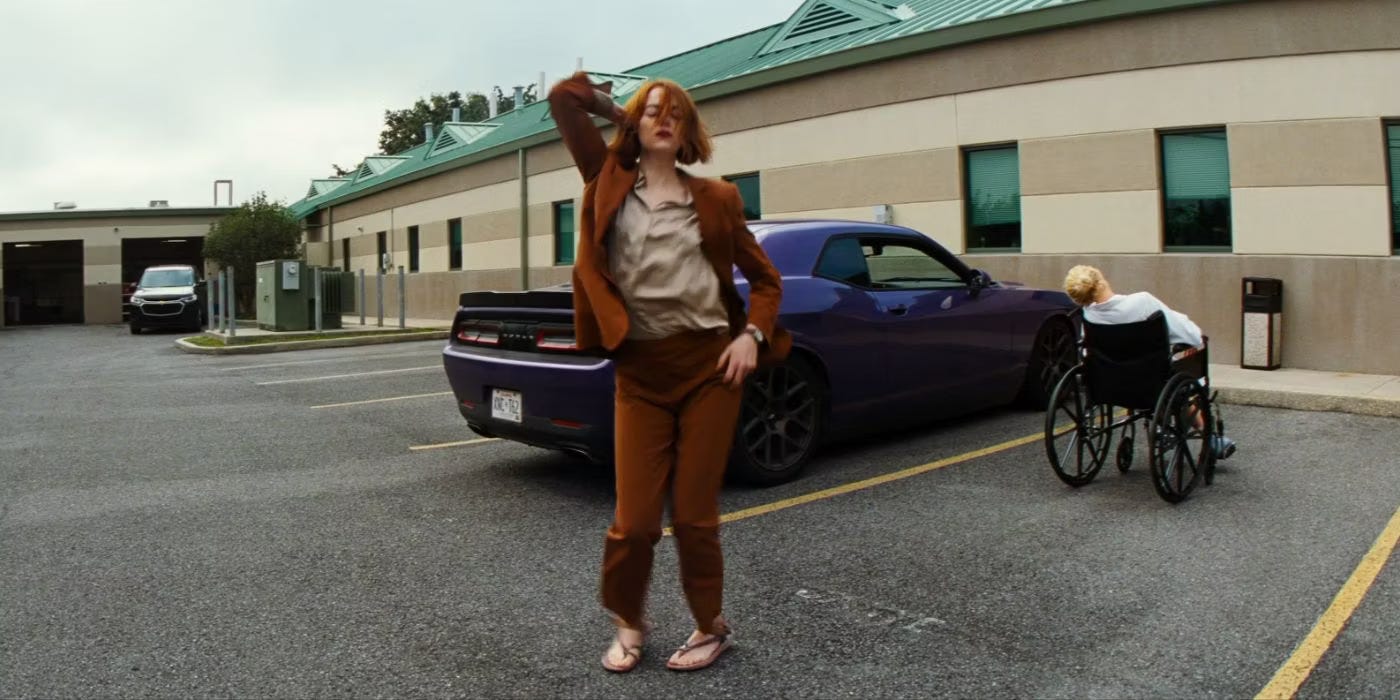We’re rewatching old seasons of Top Chef (Zach hasn’t seen them) and who waltzes into the kitchen as a Season 2 guest judge? None other than Anthony Bourdain, who goes on to describe a dish as downright Flintstonian, but with heart, and a Thanksgiving spread as the deranged lovechild of Marilyn Manson and Martha Stewart. Brutal and poetic, it was a refreshing contrast to the polite feedback served up on on competition shows and media alike. Upon hearing his unfiltered, off-the-cuff, assessments I’m reminded, as ever, to never to pull the punches.
Just movies today, restaurants and food next week.
Calculatedly twisting, deliriously entertaining, and self-consciously silly, TRAP ask us to imagine Showtime’s Dexter trying to escape an arena full of Swifties or Shadow of a Doubt’s Uncle Charlie at an Olivia Rodrigo concert. This isn’t a come back for M. Night Shyamalan, who’s been present the last three films, but for Josh Hartnett. Devilish, devious, and charming, he sells Cooper as a loving father, whose serial killer tendencies we let slide on account of his parenting skills—the mom/dad double standard at it’s peak. It’s the most fun I’ve had in theaters all summer.
Nic Cage plays a serial killer in the 90s-set LONGLEGS, which chilled me to the bone and had me reaching for a Bible—a gesture of utter futility, according to this movie’s bleak outlook. As one of those people who “don’t do horror” I’ve been titrating my terror-dose, and Osgood Perkins’s latest was more than I bargained for, espousing the kind of demonic presence it depicts. The movie itself feels possessed. That is until the conclusion-dump voiceover deflates the entire picture and we realize the only thing it’s possessed of is itself.
If this weekend you’re looking to stream something related to sweltering summer heat, look no further.
If you’ve ever wondered about my favorite theaters, my preferred movie snack, or… what I look like, check out my responses to the 11am Saturday Film Questionnaire. Thank you
for featuring me!
TWISTERS
Dir. Lee Isaac Chung
Jan De Bont’s exceedingly mediocre Twister (1994) was a cheerful work of admirable cheese. The romance had the lightest backstory, and the zany misfits in the van (Philip Seymour Hoffman! Alan Ruck! Todd Field!) weren’t well-developed but you loved them anyhow. It was wholesome, eliciting your smiles before provoking a cringe. Its sequel Twisters—incredibly bland and devoid of personality—not so much. Delving into pathos, it attempts a more serious buttoned up drama, and in doing so loses the charms of the original while also failing to update the movie for the 21st century— climate change rendered unutterable by the studios.
Let’s say Twister, a 90s icon, is a lot like Lunchables: a slightly ridiculous empty-caloried snack with its share of devotees. Then Twisters by contrast is an airport lounge cheese plate, a feeble assemblage of its core components.
CUCKOO
Dir. Tilman Singer
The terrors of the night are terrifying and squawky. Hunter Schafer fully commits to this bonkers motel-horror movie spiked with Bavarian flair. After her mother’s passing, she’s sent to live with her father and his new family (Jessica Henwick) at a creaky Alpine resort overseen by a deliciously weird Dan Stevens. Rather than mining any potentially horrific lore of the surrounding environs, Singer seems to be aiming for a more psychedelic register. Divorcing the setting from any clear temporal context (see: answering machines—and the kitschy commitment with which Stevens rolls out the word Gretchen in his German accent) helps you realize that the film is not grounded in conventional logic.
Narrative cohesion—genetic engineering, motherhood, grief, fertility are among the big ideas laid onto dreamy 35mm canvas—collapses under the onslaught of such frenetic scares and disorienting shocks. If you’re looking for the answers, you may have missed the point: visceral impact over explanatory depth. The movie’s success lies with Schafer’s sincerity, the sorrow, teenage angst, and thus the weight of the situation and the scares. In theaters August 9.
KINDS OF KINDNESS
Dir. Yorgos Lanthimos
Kinds of Kindness has been hailed by some as welcome Lanthimos-return to abject form. But, this nasty little (actually very bloated) anthology film doesn’t so much highlight the Greek director’s idiosyncratic flair for cruelty as it does provide a hackneyed low-rent version of it. Initially, I’d thought rather lowly of Lanthimos’s work—so self-consciously bizarre—until The Lobster. It’s the film of his that most effectively chronicles the painful absurdities of our desires, how far we’re willing to go to belong, and successfully packages it through the overly determined linguistic stylings of deadpan. I stand by it, a bar that he’s been unable to top since.
Kinds of Kindness takes as its thesis, dominance and control, and the types of love we subject ourselves to, while going against the principles of quality over quantity. The film exhausts the best ideas in part one, an engrossingly cryptic yarn about a corporate architect (Jesse Plemons) who dutifully complies with his boss’s (Willem Defoe) arbitrary exacting demands—a smoothie regiment, certain furnishings, evening family planning, seemingly everything outside the realm of work. We’re left in the enjoyably frustrating dark, until suddenly we aren’t. The next segment, a weak genre-piece concerning a missing wife and bodysnatcher could be the premise of another True Detective. And the last story literalizes the notions of misplaced desire for control by manifesting them into the story of a cult. Sheared entirely of the Lanthimos’s stylistic touch, this section has the feel of a prestige TV show pilot. Kinds of Kindness as a whole seems primed for streaming; in fact and one can imagine Netflix splicing it into the thirds to maximize clickage and viewings numbers.
The same troupe of actors are deployed in each segment but they aren’t acting so much as fitting into the Lanthimos mold. When the rotating troupe of players hits it right, it has the effect of stripping the words of their inherent meaning. This is not in service of a greater artistic purpose propelled by a theory a la Bresson but done to a more superficial degree to single-minded showcase the emotionally bluntedness of the human condition. To balance out the mannered detachment and Lanthimos serves us cheap jokes: Defoe in a school girl outfit, or four-some sextape, which you can sense coming from a mile away.
The best and worst parts of the movie are encapsulated in the trailer: “Sweet Dreams (are made of this)” by the Eurythmics’ played over the title credits, and Stone effortfully boogying with the kind of obstinacy that won her the Oscar—which by the time you finally get to see, towards the end of the film, feels so strained and senseless that you want to throw something at the screen.
MAXXINE
Dir. Ti West
Concluding the horror trilogy that began with X (2021), filmmaker Ti West lays his cards on the table and reveals there is little beyond what meets the eye.1 Set in 1984 LA at the height of satanic panic, MaXXXine is so possessed of its B horror trappings that it becomes a victim of its own mimicry, predictable, forgettable, and as empty as the schlock it emulates.
From its first frames, MaXXXine positively revels in the pulp aesthetics and histrionics that defined movies of this era. Blood flows in torrents, the lights are shaded crimson, kills delivered without subtlety. DePalma here, Lynch there. Flecks of giallo, an empty reverence for Psycho. Kevin Bacon in a bandage looking like Jack Nicholson in Chinatown. West pays faithful homage to his sensationalistic forebears, but this meticulously crafted pastiche suffers from a curiously sealed-off quality, devoid of the kind of infectious delight. The winking references feel perfunctory, even joyless, and this is why the Tarantino comparisons I’ve seen on Twitter are absolutely nuts. Left to merely check off the requisite trope boxes as they unspool with clockwork precision, you wonder why you’re not watching an actual 80s horror movie instead.
The hopes of any frisson arising from actors like Michelle Monoghan, Bobby Canavale, and Giancarlo Esposito in supporting roles are dashed on the rocks of the West’s disinterest. He does not mine their personas and instead obscures them by confining these talented people to mere play-acting. The magnetic scream queen Mia Goth fares better but still can’t manage to save this forgettable film. Shelve it in the way, way back, please.
Pearl is my favorite of West’s films, an origin story that transcends its outward simplicity with a staggering sense of anguish










